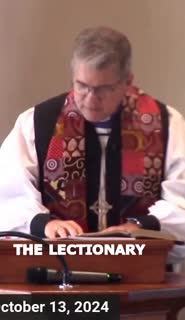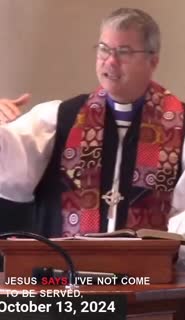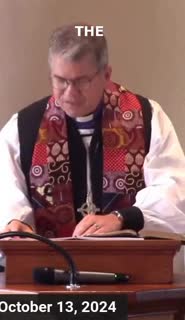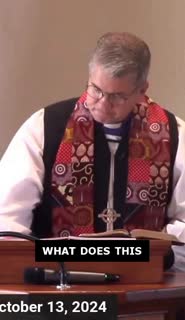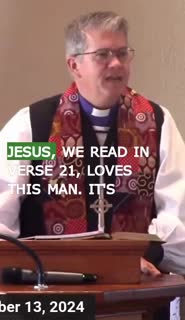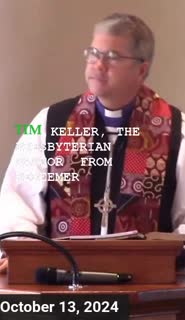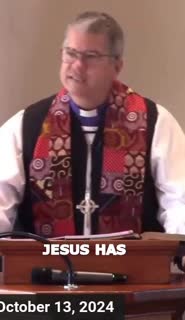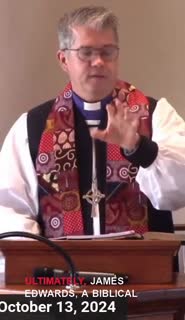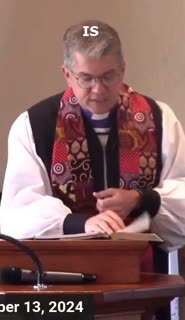Following Christ: The True Cost of Discipleship
Devotional
Sermon Summary
Bible Study Guide
Sermon Clips
1. "The lectionary in the months of September and October is taking us through these middle chapters of the Gospel of Mark. And they're all about discipleship. They're all about helping us understand what discipleship looks like. And it really should be no surprise to us that Jesus, in this passage this morning, is going to challenge our understanding of wealth, of what it means to have material possessions. Because Jesus is already pressed on so many subjects. If you go back and look at chapters 9 and 10, you'll see that Jesus has turned upside down. Our understanding of power, that he who is greatest will be a servant to all, for instance, of what it means to be great in the kingdom of God." [38:48] (43 seconds)
2. "Jesus says, I've not come to be served, but to serve, to give my life as a ransom for many. He'll say that in a few verses at the end of chapter 10. What our responsibility is towards our neighbors, that we're to be keeping account. If we call someone to sin, that it would be better for us to have, if we call someone to sin, that it would be better for us to have, that it would be better for us to have a millstone wrapped around our necks and to be cast into the sea rather than to call someone to sin. That's a high level of accountability. That's getting into our stuff in a way that we're probably not very comfortable with." [39:48] (40 seconds)
3. "The disciples are caught up in a first century understanding of wealth. Which basically has the idea that if you're wealthy, clearly you have the blessing of God. And so if you have material possessions, it shows that God has blessed you and God is with you. And sometimes I think probably in our own culture, we have the same idea. Successful things, God must be blessing them. Whether it's business or the church or government or anything else, that God is behind it. And Jesus clearly challenges that." [40:57] (35 seconds)
4. "What does this teaching of Jesus have to say to you and me this morning? Not just to this man who comes and sadly goes away heavy hearted, disheartened, as the scripture tells. What is it that Jesus wants to say to us? What is he getting at in the life of this man? And what does it say to us as would-be disciples of Jesus? Well, first of all, I want you to recognize that what Jesus does here is he removes a false notion of goodness. Who is acceptable in God's sight?" [41:48] (34 seconds)
5. "Jesus, we read in verse 21, loves this man. It's not his attempt to draw out his hypocrisy. He's not trying to challenge him or catch him. He's, he cares for this man. He loves this man. And the word love there is the, the Greek word that we get the word agape from, the, the very God-like love, the unconditional love, that love that only God can truly express. This is the type of love that, that Jesus has towards this man. It is his heart that he is after." [44:04] (32 seconds)
6. "Tim Keller, the Presbyterian pastor from Redeemer in New York City, said that if anything becomes more fundamental to your, your happiness than God, that thing for you has become an idol. God begins, Jesus begins to explore with this man out of his love for him. What is at the core of his being? What is at the core of his, his care and the center of, as we say, the heart of him, the very essence of who he is." [45:02] (35 seconds)
7. "Jesus has uncovered that in this young man's life or this man, if whether he's young or not is he at the score of his, his being, what is essential to his happiness, in fact is his material wealth. Now Jesus is not saying this is true for everyone. Jesus does not call everyone into poverty. St. Francis of Assisi famously renounces all of his worldly possessions. I believe that Francis was called, called to that and Francis lived a unique life." [46:01] (31 seconds)
8. "Ultimately, James Edwards, a biblical scholar written the commentary on this passage says that Jesus in that verse offers himself as a substitute for the man's wealth. You see, if you just read this passage and you see this man is being called to sell all his possessions, then it seems like a total loss. But when you put it in light of the fact that Jesus is offering himself in place of the wealth, he says, yes, I'm calling you to sell all you have, but I'm offering you myself. I'm taking the place of that." [48:06] (39 seconds)
9. "Jesus is consistent with what he's been saying all along to follow him is to deny ourselves is to take up our cross. And that will look different. Differently in all of our lives, but ultimately it becomes about coming to what Dallas Willard says that Jesus is enough. No matter what the sacrifice, no matter what it costs or what I'm called to give up, Jesus is enough." [49:17] (31 seconds)
10. "Jesus says to this man, yes, I'm calling you to give up your wealth, but I'm offering you myself. I want to remove the barrier. I want to remove the barrier. That would keep you from giving yourself to me. How difficult Jesus says it is for a rich man to enter the kingdom of God. Children, how difficult it is to enter the kingdom of God. Jesus knows how extreme the call on this man's life. He knows what he's calling us to. And yet he also knows the things that occupy our hearts." [52:12] (42 seconds)
Ask a question about this sermon
2. "Jesus says, I've not come to be served, but to serve, to give my life as a ransom for many. He'll say that in a few verses at the end of chapter 10. What our responsibility is towards our neighbors, that we're to be keeping account. If we call someone to sin, that it would be better for us to have, if we call someone to sin, that it would be better for us to have, that it would be better for us to have a millstone wrapped around our necks and to be cast into the sea rather than to call someone to sin. That's a high level of accountability. That's getting into our stuff in a way that we're probably not very comfortable with." [39:48] (40 seconds)
3. "The disciples are caught up in a first century understanding of wealth. Which basically has the idea that if you're wealthy, clearly you have the blessing of God. And so if you have material possessions, it shows that God has blessed you and God is with you. And sometimes I think probably in our own culture, we have the same idea. Successful things, God must be blessing them. Whether it's business or the church or government or anything else, that God is behind it. And Jesus clearly challenges that." [40:57] (35 seconds)
4. "What does this teaching of Jesus have to say to you and me this morning? Not just to this man who comes and sadly goes away heavy hearted, disheartened, as the scripture tells. What is it that Jesus wants to say to us? What is he getting at in the life of this man? And what does it say to us as would-be disciples of Jesus? Well, first of all, I want you to recognize that what Jesus does here is he removes a false notion of goodness. Who is acceptable in God's sight?" [41:48] (34 seconds)
5. "Jesus, we read in verse 21, loves this man. It's not his attempt to draw out his hypocrisy. He's not trying to challenge him or catch him. He's, he cares for this man. He loves this man. And the word love there is the, the Greek word that we get the word agape from, the, the very God-like love, the unconditional love, that love that only God can truly express. This is the type of love that, that Jesus has towards this man. It is his heart that he is after." [44:04] (32 seconds)
6. "Tim Keller, the Presbyterian pastor from Redeemer in New York City, said that if anything becomes more fundamental to your, your happiness than God, that thing for you has become an idol. God begins, Jesus begins to explore with this man out of his love for him. What is at the core of his being? What is at the core of his, his care and the center of, as we say, the heart of him, the very essence of who he is." [45:02] (35 seconds)
7. "Jesus has uncovered that in this young man's life or this man, if whether he's young or not is he at the score of his, his being, what is essential to his happiness, in fact is his material wealth. Now Jesus is not saying this is true for everyone. Jesus does not call everyone into poverty. St. Francis of Assisi famously renounces all of his worldly possessions. I believe that Francis was called, called to that and Francis lived a unique life." [46:01] (31 seconds)
8. "Ultimately, James Edwards, a biblical scholar written the commentary on this passage says that Jesus in that verse offers himself as a substitute for the man's wealth. You see, if you just read this passage and you see this man is being called to sell all his possessions, then it seems like a total loss. But when you put it in light of the fact that Jesus is offering himself in place of the wealth, he says, yes, I'm calling you to sell all you have, but I'm offering you myself. I'm taking the place of that." [48:06] (39 seconds)
9. "Jesus is consistent with what he's been saying all along to follow him is to deny ourselves is to take up our cross. And that will look different. Differently in all of our lives, but ultimately it becomes about coming to what Dallas Willard says that Jesus is enough. No matter what the sacrifice, no matter what it costs or what I'm called to give up, Jesus is enough." [49:17] (31 seconds)
10. "Jesus says to this man, yes, I'm calling you to give up your wealth, but I'm offering you myself. I want to remove the barrier. I want to remove the barrier. That would keep you from giving yourself to me. How difficult Jesus says it is for a rich man to enter the kingdom of God. Children, how difficult it is to enter the kingdom of God. Jesus knows how extreme the call on this man's life. He knows what he's calling us to. And yet he also knows the things that occupy our hearts." [52:12] (42 seconds)
